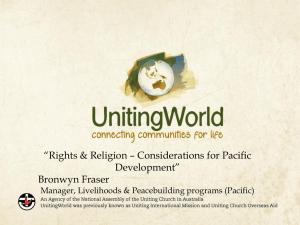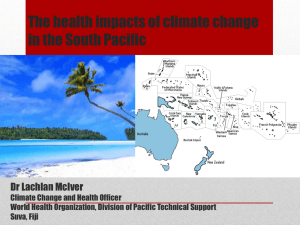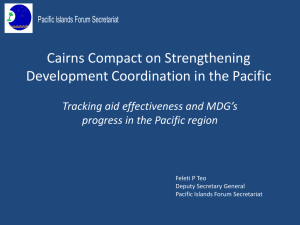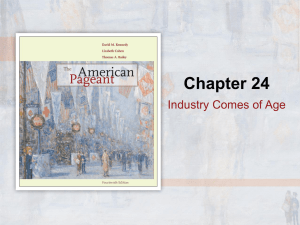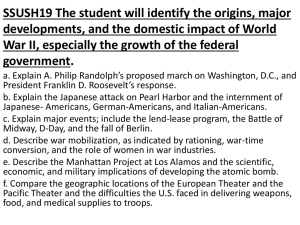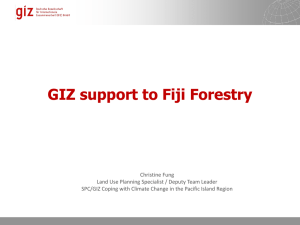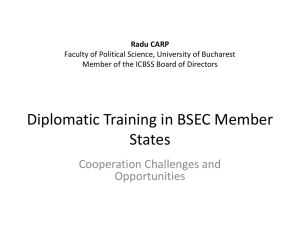A New Pacific Diplomacy?
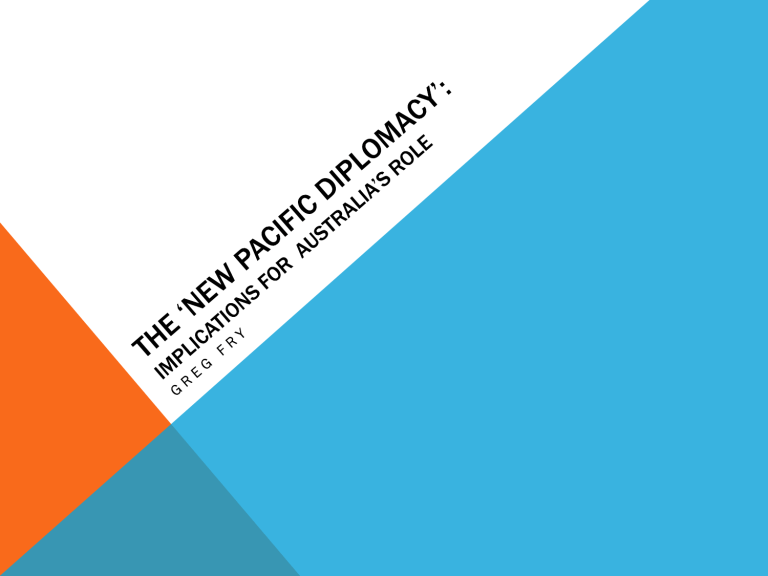
A PARADIGM SHIFT IN PACIFIC DIPLOMACY
‘I believe the Pacific is now entering a new phase – a new paradigm shift where the
Pacific needs to chart its own course and lead global thinking in crucial areas such as climate change, ocean governance and sustainable development.’
We can and must continue to work diligently together to influence world opinion on these issues because they matter to us.
President Anote Tong at launch of Pacific
International Relations Forum, 9 Oct 2012
THE ARGUMENT
1. That there is a fundamental shift in Pacific diplomacy- as fundamental as that which occurred following the Fiji- led
‘rebellion’ in the SPC in the late 1960s
1. That the explanation for the current paradigm shift is to be found in a much broader set of factors than Fiji’s diplomatic initiatives since its suspension from the Pacific Islands Forum in 2009.
2. The ‘new’ diplomacy therefore has implications beyond any future lifting of that suspension.
3. The paradigm shift has major implications for Australia’s role (or should have).
‘NEW PACIFIC DIPLOMACY’ PARADIGM
Commitment to:
• Pacific is. control of regional agenda and arenas
• Collective diplomacy in relation to global challenges
• Global diplomatic leadership in key areas
• Effective Pacific Is. organisation at global level
• Effective regional–global diplomatic connection/mandate
• Inclusivity (civil society, private sector, states)
• Effective participation in middle level ‘southern’ diplomatic organisations AOSIS, ACP, G77
EXPRESSED IN-
1. Broader leadership call for a new collective diplomacy
2. Pacific support (with some notable exceptions) for new diplomatic institutional initiatives (not just Fiji)
3. Level of frustration with Forum’s lack of action and inability to act in collective diplomacy on key issues
4. Degree to which Pacific diplomacy is now conducted outside the
Forum and the success of the new initiatives in gaining recognition
SIGNIFICANCE IN SUMMARY
There is a ‘new pacific diplomacy’ - a fundamental change in ideas, institutions and values.
A new form of regional diplomatic culture that is being promoted based on self determination and the reclaiming of a space for a ‘Pacific voice’.
As fundamental as the shift that occurred after the Ratu Mara- led rebellion in the SPC which culminated in the creation of the Pacific
Islands Forum.
It has much of the same rhetoric and the idea of creating a new institutional framework when frustrated by the structural impediments of the old.
WHY THE PARADIGM SHIFT?
• Fiji’s suspension from the Forum
• Pacific leadership and political stability
• Changing geopolitics
• Global pressures (climate change)
• Australia and NZ dominance in the Pacific Islands Forum
THE GLOBAL PRESSURES ON LEADERS TO ACT we have no choice but to engage even more aggressively internationally because the key to our survival will depend on whether international action is taken on climate change or not.
President Anote Tong,
October 2012
THE AUSTRALIAN PROBLEM
From invited guest at the table to head of the table.
Perceptions/history
Dominating agendas- war on terror, economic integration and harmonisation
Dominating form of regionalism- regional integration at expense of joint diplomacy
AUSTRALIAN PROBLEM
Conflict of interest problem - climate change, trade
Participation in southern organisations
Psychological- ownership of agenda
AUSTRALIA’S POLICY RESPONSE: THE FIJI LENS
The Aberration thesis:
Significant though it is, the new diplomatic initiatives are all explained by Fiji’s suspension from the main diplomatic system –the PIF.
We can expect a return to the Forum- focused diplomatic system and regional diplomatic culture after the suspension is lifted and Fiji re-enters the Forum.
More money to the PIF; ignore other initiatives
A MORE SENSIBLE ROLE FOR AUSTRALIA?
1. Remove the Fiji lens
2. A move from dominance to partnership in the PIF- learning from history
3. Recognition of the logistical needs for southern political grouping
4. Recognition of MSG key role in effective regional integration
LEARNING FROM KEN PIDDINGTON 1973
[The Forum] is an exercise in partnership . Australia and
New Zealand sit at the table as equals, and are not dominant partners.
It is tacitly understood that Australia and New Zealand will defer when it comes to deciding the direction which the Forum as a whole should take in asserting its role in the region.
Ken Piddington, Deputy Director of SPEC and former Ministry of FAs, Wellington
5. Recognition that Global pacific diplomacy effort has moved outside the Forum- should not compete in current configuration
6. Openness to new friendly proposals of restructuring to ensure both Pacific island ownership and close ANZ partnership (like USP partnership)
7. Openness to principles of PIDF –inclusivity of civil society, private industry, consultative assembly, mandate for UN etc


